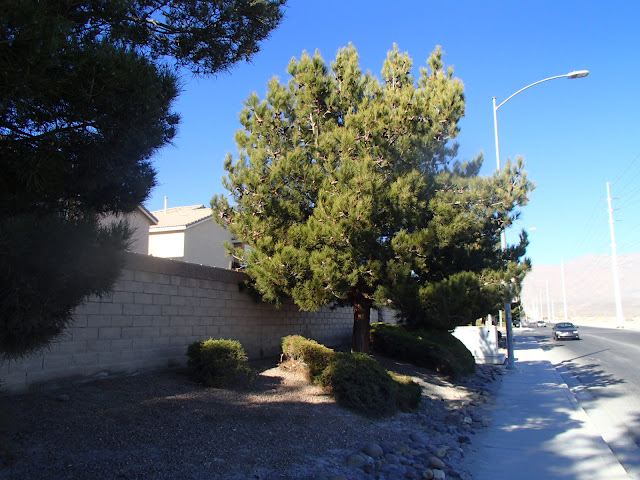 |
| This pine is struggling. Notice the open canopy, how thin it is. It is either not getting enough water or it was rootbound at planting time. |
Q. Several pine trees on municipal park property provide privacy
from people who frequent the adjoining park. All these pine trees have done
well over the last 20 years except for one that is about half the size of the
others. It’s in a perfect spot to provide privacy for me but doesn’t because of
its size. It gets plenty of sun and is not overcrowded by other trees, but I
don’t see any water for any of them. How do I help the little guy pine tree get
to the same size as his big guy brothers?
 |
| This pine tree is getting enough water. Notice how full and dense the canopy is. |
A. All those pine trees are irrigated, or they wouldn’t survive
in our desert climate and put on decent growth year after year. The smaller
tree could have a problem all its own, separate from the others.
Is it Rootbound?
The
fastest way to find out is to push hard on the tree trunk. You may have to push
several times. After these many years, that tree should be solidly anchored
into the ground. If it’s loose in the soil, the tree has a rooting problem and
should be replaced. If a tree with this problem is not replaced, it will always
be small and never grow regardless of what you do.
 |
| Plants that are rootbound can end up with strangling roots that choke other roots. These can be removed with they are young. Be careful when the roots are large. |
When you
push on it, there should be no soil movement where the trunk enters the ground.
If you do see movement beneath the trunk, the tree was “root bound” when it was
planted and never became established in the surrounding soil. That would be
unfortunate, but this happens too frequently to landscape plants grown in
containers.
 |
| Plants left in containers too long can create root problems. |
“Rootbound” plants have roots that grow in circles inside the container. This root
growth problem begins when plants are very young and is seldom a problem that
develops when they are older.
It is
possible plants can become “root bound” if they are grown in a container which
is too small for them for too many years. I suggest consumers don’t focus on
the “largest trees they can find”. Smaller plants, that are healthy and growing
rapidly, are always a better choice and will establish in the landscape faster.
Lack of Water
Another
possibility is a lack of water. Inspect the soil to make sure that irrigation is
not the issue. If the plant is not root bound, water the soil under the canopy
of the tree with a hose, sprinkler and mechanical timer for one hour, once a
week. Do this during the summer months. Fix the irrigation problem of course
but the extra water once a week will help push new growth faster.
Fertilize
pine trees once a year in the spring with a tree and shrub fertilizer such as
16-16-16 or 20-20-20.
No comments:
Post a Comment